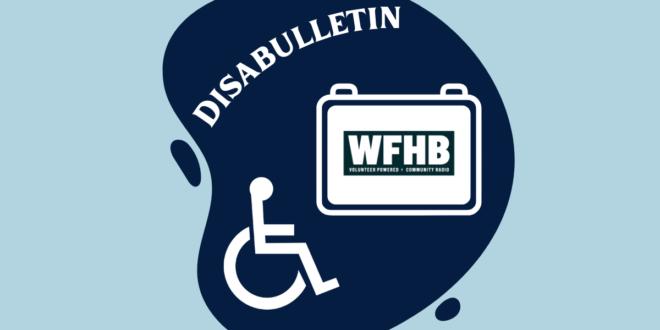Podcast: Play in new window | Download (Duration: 11:46 — 9.3MB)
Subscribe: RSS

In Today’s Disabulletin, WFHB Correspondent Abe Shapiro speaks with attorney Jeremiah Frei Pearson about a lawsuit against the ride-share company Lyft over its alleged lack of Wheelchair Accessible Vehicles, or WAVs. Lyft officials cited a limited supply of Wheelchair Accessible Vehicles and driver availability as reasons why WAVs are only available to Lyft riders in nine cities across the entire U.S. To provide insight on the issue, we turn to an interview with attorney Jeremiah Frei-Pearson, of the disability rights group involved in the lawsuit, Westchester Disabled On the Move Inc. who broke down the specifics of the case and arguments from both sides.
Shapiro:Good evening, I’m Abe Shapiro and this is Disabulletin.
My guest today is Jeremiah Frei Pearson, the Lawyer fighting on behalf of Westchester on the Move in their lawsuit against Lyft. Since receiving his law degree from Stanford Law School in 2003, Mr. Frei Pearson has sought to advocate for individuals to obtain their civil rights. His notable victories range from helping individuals reclaim their right to privacy by successfully settling with companies following data breaches to ensuring fair wage compensation for employees.
As a result of the victories, he has won for his clients, the National Trial Lawyers Association selected Mr. Frei-Pearson as a member of the Top 100 Trial Lawyers from 2014 to 2018. Mr. Frei-Pearson is a member of the Best Attorneys of America, a distinction limited to less than 1% of attorneys, and he is also designated as a Super Lawyer. Mr. Frei-Pearson practices in federal and state courts throughout the country and his areas of expertise include class actions, privacy, consumer fraud, employment law, and civil rights. Jeremiah Frei Pearson, welcome to the Disabulletin broadcast, sir.
Frei Pearson: Thank you, I’m excited to be here!
Shapiro: So first and foremost, how, and what led you to a career in law and why specifically the disability sector? Bearing in mind that I know you worked with one of the architects of the ADA [Americans with Disabilities Act], Senator Ted Kennedy.
Frei Pearson: So that’s a long question but I chose to go to law school over 20 years ago because we live in a society where powerful interests, for lack of a better word, often harm regular people and I know a legal degree is a tool to make things a little bit more fair. So that’s why I went to law school, and I’ve been blessed in my legal career to represent people who were in unfair situations and change broken systems, so very blessed with how all of that has worked out. I did intern for Senator Kennedy over 20 years ago, but as an intern, my contributions were almost limited to walking his dog literally, so I can’t take ADA credit for that passage, although his contributions to the ADA as well as President Bush harken back to a bipartisanship that I miss in terms of making government work for everyone.
- What are the fundamental facts of the case by Westchester Disabled On The Move? Who began the lawsuit and why?
Frei Pearson: In terms of this case, I have a brother with significant special needs, so I have always been involved in the disabled community and I for a while chaired the Mayor’s Committee for People with Disabilities in my hometown of White Plains. And we heard from numerous constitutions about how Lyft was refusing to serve people in wheelchairs. At the time we filed this lawsuit, it was almost everywhere, and it remains almost everywhere. In 96% of the areas where Lyft operates, it refuses to provide any service for people in Wheelchair Accessible Vehicles. And you might be wondering about the 4% of the areas where it does provide Wheelchair Accessible service, why does it do that? The only reason Lyft provides Wheelchair Accessible service in the 4% of the areas where it does is because regulators in those jurisdictions tell Lyft, “Either serve people in wheelchairs or we won’t let you operate at all.”
Every single time Lyft has been required by a regulator to serve people in wheelchairs, it has done that. And every single time what Lyft does is it provides the bare minimum service possible. The person in charge of Lyft’s national WAV’S, and WAV’S is short for Wheelchair Accessible Vehicles, the person in charge of this came up with a plan to provide national WAV’S everywhere in the country cheaply. And then the executive decided not to do that. And then they came back with the line that their biggest risk is being forced to scale, which in English means Lyft’s biggest concern is being forced to serve people in wheelchairs everywhere. Where it does provide service, it intentionally provides the worst service possible and sabotages that service because it doesn’t want to be seen as providing good wheelchair-accessible service, because then it would be made to provide more service. And where I live in Westchester County, New York, the situation is particularly grotesque, because the area where Lyft provides the best service is in New York City, where they’re required to do so by regulations.
Shapiro: Oh yes, I did read about the TLC’s [The New York Taxicab and Limousine Commission’s] 25% mandate and the controversy that did arise over that a number of years ago. So I understand that there has been some significant progress in New York City.
Frei Pearson: There’s been very significant progress and it came in large part due to the expert witness in our case, Alex Elegudin, who designed the regulations in New York City. Lyft, as it always does, first argued that it couldn’t possibly serve people with wheelchairs in New York City or otherwise it would go bankrupt and have to leave New York City. Like most of Lyft’s other arguments that they use to avoid people with disabilities, that argument’s a lie and that includes Lyft’s argument, “We’re not a transportation company.” Lyft now provides much better service in New York City. And what we know is, every month many Wheelchair Accessible Vehicles drive from New York City to Westchester County, right in the suburbs where our federal courthouse is located. When those vehicles are in Westchester County, Lyft blocks them from advertising as a Wheelchair Accessible Vehicle. So you can be sitting on one street in the Bronx and you can say, “I’d like to get a Wheelchair Accessible Vehicle.” There can be a car on that lot and Lyft’s app will show it. You walk across the street so you’re no longer in the Bronx, and you’re in Westchester County, or you wheel across the street, and you’d like to get a Wheelchair Accessible Vehicle, you see none. One of the basic things we’re asking for is, “Lyft, just turn off the blocker, and let people with disabilities be served.” And we’re hopeful that if Lyft doesn’t do that voluntarily, then Judge Halpern will make them.
Shapiro: What would you say are some of Lyft’s arguments to turning off the toggle system?
Frei Pearson: So, Lyft has spent millions of dollars, they have great attorneys, they have very smart expert witnesses, they’ve spent millions of dollars defending a system that I believe is indefensible. In addition to their argument that they’re not a transportation company, or that the Americans with Disability Rights Act or the New York state’s human rights law don’t apply to them, their two main arguments and there’s two things we talked about, the toggle and the blocker, which are little different. But the main reason why they have the blocker, in 96% of the regions that prevent any Wheelchair Accessible rides, the real reason they have it is they think they’re above the law. Their justifications are twofold. One, they say there aren’t enough people with disabilities to justify Lyft serving them, which is insulting. And imagine if McDonald’s said, “In this small town, there’s only 15 people in a wheelchair, so we’re just not going to have our store be accessible.” The ADA was passed over 30 years ago to prevent that nonsense. The other argument they make is that their service might not be good enough for people with disabilities because there might not be enough Wheelchair Accessible Vehicles and therefore, they shouldn’t provide any service. And what makes that argument really gross, as I’m sure everyone who’s tried to call Lyft has experienced sometimes, quite often there aren’t Lyfts when you call Lyft as an able-bodied person. In fact, in many areas in the country where Lyft operates, the usual result of calling a Lyft is no Lyft is available. And if one is available, you have to wait a long time. That’s certainly true in rural areas for able-bodied people. Now Lyft does not refuse to serve able-bodied people in those rural areas, there’s not a single instance where Lyft said, “You know what, our service metrics aren’t good in this county, so we’re just not going to serve able-bodied people, “they always provide service. But what they say when it comes to people with disabilities is, “Well, our service might not be very good enough we should provide no service.” Again, to use the McDonald’s analogy, that’s like if a store where, for whatever reason, the service wasn’t very good. It took like 20 minutes for them to make your burger. And so they go, “Look, it takes us 20 minutes to make these burgers. And it’s even harder for people with disabilities to get into the store, so we’re just not going to serve people with disabilities in this store.” That’s really what Lyft’s argument comes down to, it’s insulting. And we look forward to it being declared unlawful by a judge.
Shapiro:I understand as well that some of these transportation companies work with third-party providers and do work to recruit drivers and yet company officials hold that these solutions aren’t feasible. Why do you believe Lyft is combatting these allegations and why would there not be enough WAV vehicles?
Frei Pearson: I honestly think it’s an excuse or a pretext. I can’t know for sure what’s in people’s hearts. But I’ve deposed the people that Lyft puts in charge of its programs, I’ve deposed Lyft executives that would have taken their testimony under oath, and I’ve seen their internal documents, and what they say is not “oh man, we really want to serve people with disabilities, we just can’t figure out how.” What the internal documents very clearly say, and what Lyft’s wonderfully coached witnesses will almost admit, and will basically say the words that make clear that this is true when you have them under oath is Lyft doesn’t want to do it. And I think the honest reason why Lyft doesn’t want to do it is because Lyft got into this business to expand transportation and when they did it they weren’t thinking about people with disabilities. No one’s saying that ten years ago when Lyft started up, they were maliciously setting out to revolutionize transportation and exclude people with disabilities. But they were setting out to build a transportation empire and they didn’t think about people with disabilities. And then when advocates started saying, “Hey you got to serve wheelchair users”, their initial instinct was, “Well, this is inconvenient for us.” And rather than deal with the fact that they would have to do some basic things to serve people with disabilities, they lawyered up and they fought it everywhere. And again, the only time Lyft has served people with disabilities who are in wheelchairs is when the jurisdiction has said, “You either serve people with disabilities or you leave.” And because that has not happened nationwide, we’re using the Americans with Disabilities Act and other civil rights laws to make Lyft fix this really discriminatory and gross conduct.
 WFHB Bloomington Community Radio
WFHB Bloomington Community Radio


